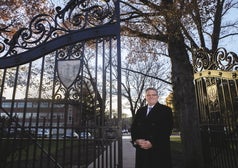Program could chop $5K from cost of bachelor's degree
 PHOTO/COURTESY
Students at Mount Wachusett Community College would be among those that could benefit from the program.
PHOTO/COURTESY
Students at Mount Wachusett Community College would be among those that could benefit from the program.
In an effort to make a college education more affordable for Massachusetts students and families, Gov. Charlie Baker on Thursday will detail a sweeping new program would allow thousands of community college students to earn four-year degrees through rebates on tuition and fees and costs protected from annual increases after a student enrolls.
The agreement reached between the administration and public higher education institutions commits every public two-year and four-year campus to providing a 10 percent rebate on tuition and fees to qualifying full-time, undergraduate students at the end of every successfully completed semester, according to officials familiar with the plan.
Students who maintain a 3.0 grade point average and complete their associate's degree in under two-and-a-half years at any of the state's 15 community colleges would become eligible for a full tuition waiver upon transferring to any University of Massachusetts campus or state university to complete their undergraduate studies.
Tuition and mandatory fees would also be frozen for participants based on the date students enter the community college program, making their expenses more predictable and shielding students from gradual increases that can strain their finances.
According to an administration official, students who meet the program requirements will save an average of $5,090 on the cost of a bachelor's degree.
"This program was designed to decrease the cost of a college degree and accelerate on-time completion for students across the Commonwealth," Baker said in a statement provided to the News Service. "The Commonwealth Commitment will make it even easier for students to go to school full-time and begin their careers with less debt and we are pleased that our higher education officials have worked collaboratively to make this program a reality."
The governor plans to unveil the new program Thursday morning at a ceremony at Middlesex Community College in Lowell where UMass President Marty Meehan, Worcester State University President Barry Maloney and Middlesex Community College President James Mabry will sign the agreement as representatives of the three segments of the public higher education system.
The push from the administration on college affordability, which expands upon some programs already being tested on some campuses, comes at the same time the governor has signaled an interest in offering families a tax deduction on college savings.
Baker this month attended a dinner at the Union Club in Boston with the board of the Association of Independent Colleges and Universities in Massachusetts where he encouraged the group to approach lawmakers about tacking the college savings tax deduction onto his $918 million economic development bill.
The Legislature's Revenue Committee has recommended a bill (S 1468) that would create a $1,000 annual tax deduction for single filers and a $2,000 deduction for joint filers on savings put away for college into 529 plans. Of the 42 states with an income tax, Massachusetts is one of only eight that doesn't offer a deduction for college savings.
"I thought that was something that sounded consistent with some of the human capital development ideas that were part of our bill already and if they wanted to take that up with the Legislature, that would be fine by us," Baker recently told the News Service about his dinner with the AICUM board.
In addition to the national attention being paid to college affordability, proponents of the tax policy changes say they have reason to be optimistic this year because of a new proposal written into the bill to cover $7 million of the $8.2 million hit to state revenues by limiting an existing tax break for college tuition payments to Massachusetts residents only.
"Let's face it, in tight fiscal times proposals that are more likely to be able to pay for themselves are always easier to process than ones that don't," Baker said.
AICUM President Richard Doherty said he was pleased to hear Baker offer his support for the bill: "I think that he saw there was an economic development angle to it was terrific."
Given the slow pace at which many bills have moved this session, Doherty acknowledged that attaching the college savings tax deduction to a larger bill like Baker's economic development proposal could help its chances of getting through.
"It's a perhaps a more modest proposal than what exist in other states but it's worth being able to get it on the books, prove that it does in fact act as an incentive in both the number of accounts created and the frequencies of deposits to existing accounts," he said.
The new tax deductions would require legislative approval, but "Commonwealth Commitment" can be executed independently by Baker and the public higher education system.
UMass and state universities will begin offering the program for students in 14 degree programs starting in the fall covering everything from biology to political science. Ten additional degree tracks will be added in the fall of 2017.












0 Comments